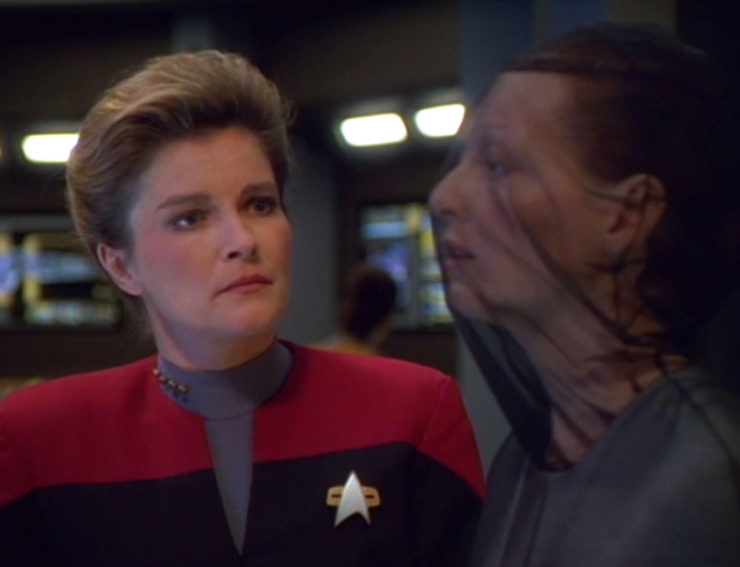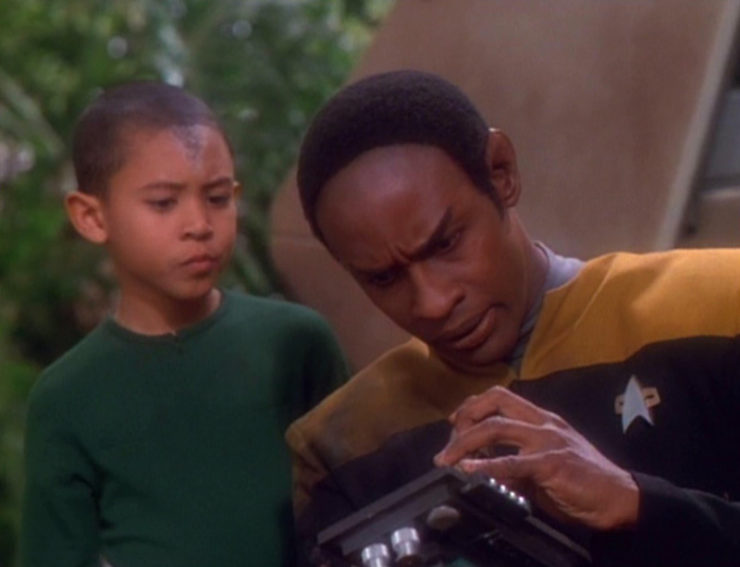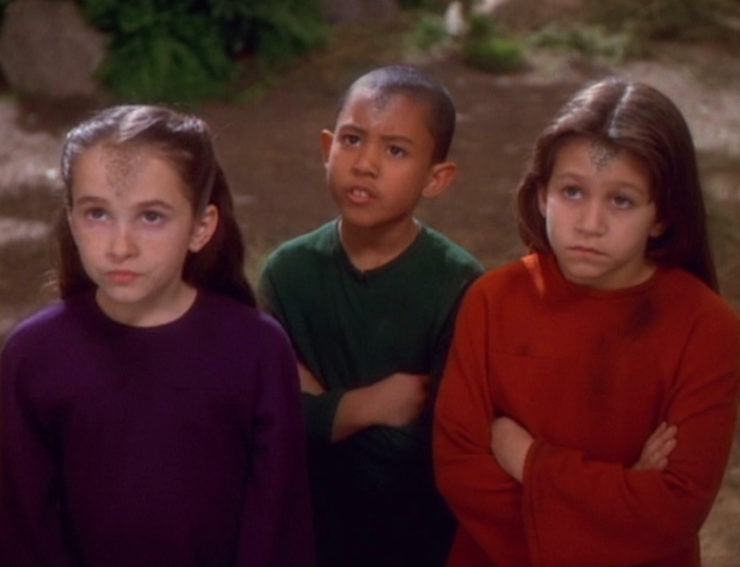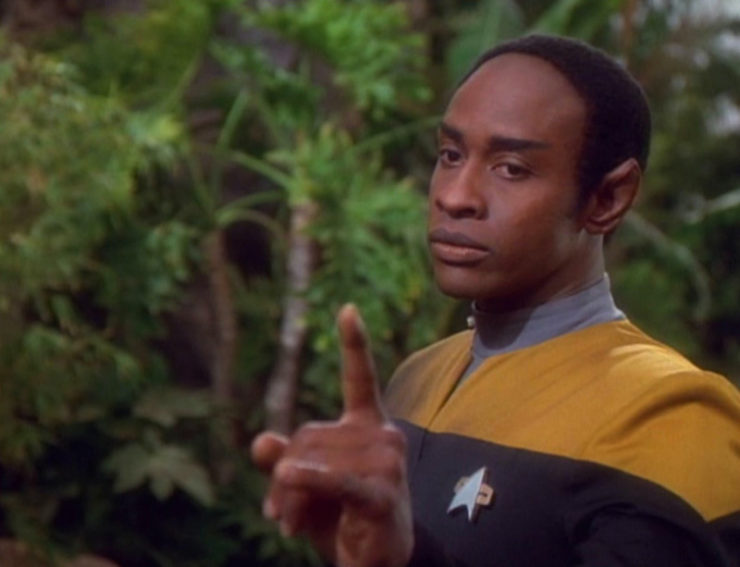“Innocence”
Written by Anthony Williams and Lisa Klink
Directed by James L. Conway
Season 2, Episode 22
Production episode 138
Original air date: April 8, 1996
Stardate: 49578.2
Captain’s log. A shuttle from Voyager has crashed on a moon. Tuvok survived the crash, but Ensign Bennet did not. His last words are regret, as he’d always thought he was lucky that he had no family back in the Alpha Quadrant, but now that he’s dying, he regrets not having anybody to remember him. Since he’s not an opening-credits regular on the show, he can rest assured that no one would remember him anyhow.
Tuvok puts his body in stasis to protect it until he can get the body back to Voyager, then discovers that he’s not alone: three children, Tressa, Elani, and Corin, have also crash-landed on the moon, and the other people on their ship died as well. When Tuvok assures them that he will do everything he can to get everyone off the moon, all three kids hug him.
We cut to Voyager, where we get the whole story: the Drayans are a very isolationist people, but the moons surrounding their planet are full of polyferranides, which Voyager needs. Despite their xenophobia, the Drayan first prelate, Alcia, agrees to come on board and meet the crew, as she is intrigued by their story.
Buy the Book


To Sleep in a Sea of Stars
The children are impatient for Tuvok to fix the ship, but he responds with typical Vulcan bluntness with regard to their situation, refusing to sugarcoat it. (He also disappoints the kids by telling them that the only food they have available are rations.) The kids promise to sit quietly and behave well while Tuvok effects repairs and then they proceed to run around like crazy and behave badly.
Alcia is taken to engineering first. She explains that Drayans used to obsess over technology, but it became more important than the people themselves, and so they had a reformation to move away from technology. Chakotay points out that some humans have done that, too. But Alcia says that Drayans have avoided all contact with outsiders so that won’t happen again.
As night starts to fall, the children get scared. They are afraid of the Morrok, a creature that will take them away. They reveal that there were two other children with them, but the Morrok took them. Tuvok is skeptical, and he checks the children’s crash site, finding no evidence of a Morrok (or of the other two kids).
A Drayan ship flies overhead, and the children are scared to death of being found by the people on board. Tuvok accedes and hides from the search parties with the kids.
After visiting sickbay, Alcia is called away. Janeway is hoping this was the first step toward a trade agreement, but Alcia shuts that down, saying Voyager should continue on its way, but thanks for letting us visit!

Disappointed, Janeway calls back the various survey teams, but Tuvok and Bennet don’t report back. A search for them finds their shuttle and a body on a moon, but sensors can’t get any better a read on the moon’s surface. Alcia contacts them and is livid that one of their shuttles has violated their crysata—the moon is sacred ground to them. Janeway apologizes, and just wants to retrieve their people and go on their way.
As night drags on, Tuvok tries to get the kids to sleep, but they’re too scared. So he sings a song he used to sing to one of his children, “Falor’s Journey,” which puts them to sleep.
However, the next morning, Elani and Corin are gone, leaving only Tressa. Tuvok is concerned, and leaves Tressa at the shuttle with a phaser (a rather insane notion) while he checks out the nearby cave. There, he finds the other children’s clothes, and now he’s wondering if the Morrok is real.
Tuvok manages to repair the shuttle enough to take off. Kim is able to punch a comm signal through temporarily, and Tuvok and Janeway each fill the other in, including Tressa’s fear of the Drayans—which answers Janeway’s question as to what’s taking the Drayans so long to find them. Janeway takes Paris in a shuttle to the surface against Alcia’s wishes.
Alcia opens fire on Tuvok’s shuttle, and it crashes again. Paris lands the other shuttle, and everyone confronts everyone else. Alcia reveals that Tressa is actually 96 years old. Drayans age backwards, apparently, and when they reach this age they get confused and forgetful. They come to the crysata to die, with the attendants to aid them. But the attendants died in the crash. Upon seeing how much Tressa has bonded with Tuvok, Alcia realizes that Tuvok has served in the role of attendant, especially since Tuvok offers to stay with her to the end.
Janeway and Alcia both offer apologies, each realizing they’d misjudged the other. They leave Tressa to face her demise in peace, as she and Tuvok enter the cave.
There’s coffee in that nebula! Janeway waxes rhapsodic on the subject of first contacts, as does Chakotay, and they’re both thrilled at the opportunity to meet with the Drayans. At first, things seem to go well, and she even quotes Plato at Alcia at one point, so she’s that much more disappointed when Alcia buggers off without continuing relations.
Mr. Vulcan. Tuvok tries to teach the children various Vulcan meditative techniques, to poor effect. Still, he generally does a very good job of taking care of them, showing his parental skills.

Half and half. Torres is thrilled to report that there’s tons of polyferranides on the moon she and Neelix checked out, which makes it that much more disappointing when Janeway tells her that the Drayans don’t wanna come out and play.
Please state the nature of the medical emergency. Kes has apparently been coaching the EMH in how to be diplomatic, and he does fairly well when Alcia is brought to sickbay. When she leaves suddenly, he fears he screwed something up, though both Janeway and Kes assure him he did fine.
Do it.
“He always used to ask me to play ‘Falor’s Journey.’ It is a tale of enlightenment consisting of 348 verses.” (Awkward pause and a devastated look on the kids’ faces.) “It may not be necessary to include the complete narrative.”
–Tuvok introducing his bedtime story, which his youngest son was very fond of.
Welcome aboard. Marnie McPhail plays Alcia; the actor will appear in First Contact as an ill-fated Enterprise engineer and as one of the Starfleet officers in the game Star Trek: Borg.
The three kids are played by Tiffany Taubman (Tressa), Sarah Rayne (Elani), and Tahj D. Mowry (Corin), while Richard Garon plays Bennet
Trivial matters: Voyager was last seen looking for polyferranides in “Tattoo.”
Of the three child actors, only Tahj D. Mowry is still in the biz, as it were, most recently having a starring role in Baby Daddy as Tucker Dobbs. Neither Tiffany Taubman nor Sarah Rayne continued acting once they reached adulthood.
The saying Chakotay speaks to Alcia when she beams aboard, which he says translates to, “Peace in your heart, fortune in your steps,” is not based on any actual Indigenous sayings, and the language he speaks the saying in doesn’t appear to be any actual Indigenous language. More nonsense from fake Indian advisor “Jamake Highwater.”
Voyager at this point has 147 people on the ship. They left the Ocampa homeworld with 154, and added one (the Wildman baby, born in “Deadlock”), while one departed (Seska in “State of Flux”), and seven have now died (Durst in “Faces,” Bendera and two others in “Alliances,” Darwin in “Meld,” Jonas in “Investigations,” and Bennet here). Only 145 are in a position to help on board, though, as one is an infant and the other is confined to quarters (Suder).
This is the second time Trek has gone all “The Curious Case of Benjamin Button” and given us a species who ages backward, the previous time being in the animated episode “The Counter-Clock Incident.”

Set a course for home. “May this day find you at peace and leave you with hope.” If it wasn’t for the ending, I would totally give this episode a 9 or a 10, as it’s really excellent. Tim Russ proves himself once again to be one of the best parts of Voyager, as he imbues Tuvok with a strong sense of compassion, of efficiency, and of logic. Best of all, though, is that he shows that he’s an excellent parent. Yes, he is a bit blunt with the kids, but he’s also honest and straightforward with them—and never condescending. Speaking as someone who works with kids a lot (teaching them karate), I’ve found that talking to children like they’re people (rather than talking down to them like you’re a grownup and they’re dumb kids) is much more effective, and that’s how Tuvok talks to Tressa, Elani, and Corin.
I also love that Russ actually breaks into song. Scripter Lisa Klink has said that she wrote that bit specifically to take advantage of Russ’s singing voice, which is excellent. (Russ still performs at convention appearances, too. I’ve seen him sing at both I-Con and Farpoint over the years…)
On top of that, it’s a strong first-contact situation. I adore the joyous exchange between Janeway and Chakotay about how thrilling first-contact situations are, even when they go badly (Chakotay gives an example of a fuckup he made early in his career). Marnie McPhail does a great job as Alcia, her fascination for Voyager’s story warring with her cultural mores. I also like that the Drayans are basically humanoid, but they wear full transparent face coverings. It’s a nice symbol of their isolationism and desire to avoid contact with outsiders.
But then we get the “sci-fi twist” that the kids aren’t kids at all, they’re actually elderly, they just happen to age backwards, and they weren’t being annoying bratty kids, they’re just confused and befuddled with age. And, um, no.
First off, this takes the zing out of Trek doing a show focused on kids right. The franchise is wildly inconsistent on the matter. On the one hand, you have the brilliance of “Disaster,” “Nepenthe,” and the characters of Jake Sisko and Nog. On the other hand, you have the wretchedness of “And the Children Shall Lead,” “Rascals,” and the character of Wes Crusher.
“Innocence” would nominally fall into the former category, but for the ending. And while the twist probably seemed like a good idea in the writers room, it utterly failed on execution, because childishness and dementia are not the same fucking thing.
This one is personal for me, because I spent the years between 2008 and 2016 watching my grandmother suffer from dementia, and the notion that running around and playing and asking silly questions and demanding things you can’t have and being scared of monsters is exactly the same as dementia or Alzheimer’s or senility or whatever (the script soft-pedals the notion, which doesn’t help) is at best ignorant and at worst insulting. The biggest issue with the analogizing of childishness to senility is that throughout the episode, Tressa, Corin, and Elani are completely coherent. Their sentences follow from one to the other, they’re aware of their surroundings, and they remember what they just said a minute ago.
And yes, they’re aliens, and yes, you can excuse why it’s not the same because of that, but the script is constructed in such a way that we’re supposed to think that the kids were acting like that due to the symptoms of old age, and we’re supposed to recognize it from human experiences. Star Trek aliens are almost never intended to be truly alien anyhow, they’re generally meant to be analogues for a type of human behavior, and this is a prime example of it. This was an attempt by people who don’t really get science fiction beyond “oooh, it’s weird space stuff” to do science fiction and failing at it.
Having said all that, I’m still ranking this episode high, because the work that was done up to the ending was so good—and so is the very ending, when Tuvok holds Tressa’s hand and goes with her to the cave. From the moment he sees the kids all the way to when he goes into that cave, Tuvok is acting as a guardian, and he’s really good at it. (Well, okay, except for the part where he hands a deadly weapon to a child and leaves her alone, which is seventeen kinds of nuts.) It’s one of the best vehicles for Russ’s superlative portrayal of a Vulcan, being true to what the previous thirty years had established about Vulcans.
Warp factor rating: 7
Keith R.A. DeCandido will be attending KAG Kon 2020: Home Invasion, an online event focusing on Klingon related stuff this coming weekend. Keith will be doing a reading, which will be available throughout the weekend, and also doing panel discussions on his Klingon fiction and on Klingon religion. Here’s his schedule.











Congratulations to the winners! But I did notice onr thing: Lois Bujold is 2/2 on the Best Series. But I think she’s out of series. So I wonder who will win next year.
I have crunched the numbers here.
Closest result of the night was Best Editor Short Form – Lynne M. Thomas and Michael D. Thomas finished just 6 votes ahead of Sheila Williams.
Most crushing victory was File 770 for Best Fanzine, 20 votes short of a first-count win, easily getting there on the second count.
Missed being on the final ballot by a single nominating vote:
Archive of Our Own (Best Related), would have replaced Sleeping with Monsters;
C.C. Finlay (Best Editor, Short Form), would have replaced Sheila Williams;
Yuko Shimizu (Best Professional Artist), would have replaced Kathleen Jennings;
Black Gate (Best Fanzine), would have replaced Rocket Stack Rank.
Declined nomination:
Best Series – The Broken Earth (N.K. Jemisin);
Best Editor Long Form – Liz Gorinsky;
Best Professional Artist – Julie Dillon;
Best Fancast – Tea and Jeopardy
For Best Series, N.K. Jemisin declined for The Broken Earth;
the following were ruled ineligible, due to not having added enough to the series since last year:
The Expanse,
The Craft Sequence,
the October Daye books
@1 – Don’t forget Sharing Knife, which is pretty nifty too.
Congrats to all of the authors and to Tor, who had another strong year.
Aha. Jemisin declined. That explains a lot, as I couldn’t figure out how the heck Broken Earth didn’t even get nominated. And it makes sense, the idea of the series award was, at least in part, to call attention to series that didn’t have individual books strong enough to win the Hugo. Obviously, that was not the case with Broken Earth.
Oh the hold list already for best novella and just started [book one of the series for] the best novel at my local library…and it turns out I have best Graphic Story sitting in my pile of library books at home.
Seems I’ve got some reading to do.
Well done Hugo winners!
The Broken Earth books were the only ones that ever made 2nd person Point of View work for me as a reader.
@3, RobM, but the rules of the Series award is a new work must have been added to the series in the year of eligibly. Since the Sharing Knife is finished, it can’t get a nod. While I love Bujold, the Sharing Knife is not for me. It has a cool magic system, but the rest of the story bugs me.
So, it’s open season on who will win the next Series Award. :-D
All around, a pretty good year. (1943 wasn’t bad, either) Only a couple of my actual first choices won, but there was nothing to argue with.
@6 I wonder if next year might be October Daye’s year for Best Series. InCryptid came in second according to the stats published by @2 (thanks for your hard work!), and I think October Daye is by far the stronger of the two. With two volumes published since its last nomination it would be very strange if it didn’t make the cut on rules grounds again. With Bujold out of the picture for the foreseeable future, it may open up the category.
I do hope that Jemisin’s declining the nomination doesn’t set a precedent for turning Best Series into a lesser category than Best Novel. I do think that the genre needs an award for a work in which the whole is greater than the sum of its parts, as opposed to a backup award for “good, but not good enough for Best Novel”. I’d hate to end up with a situation like the Oscars, where the existence of Best Animated Film seems to be making it artificially difficult to nominate an animated film for Best Picture.
@8 I found it interesting that InCryptid placed second this year while October Daye placed sixth last year. (I agree with you that the latter is the stronger series.) I suspect this may reflect the difference in electorates between a California WorldCon and a Finnish one, and to the extent that it does (the strength of the rest of the field being the most obvious other factor) I also suspect next year’s Irish WorldCon’s membership will be closer to the latter than the former. But who knows really.
@6 – Well, Ms. B could fix that defect by writing another work in the SK world. Dr. Dag, Medicine Man anyone?